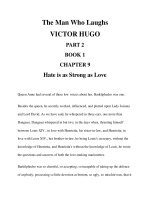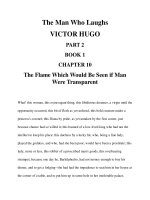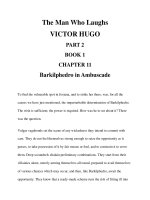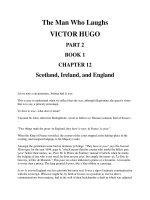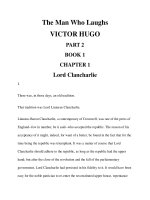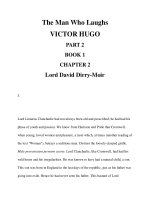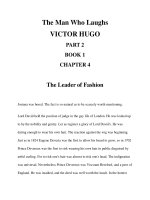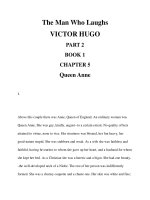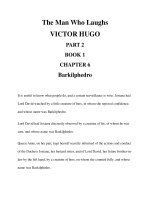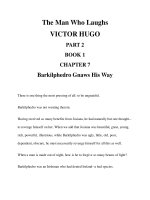The Man Who Laughs VICTOR HUGO PART 2 BOOK 1 CHAPTER 9 pdf
Bạn đang xem bản rút gọn của tài liệu. Xem và tải ngay bản đầy đủ của tài liệu tại đây (29.34 KB, 11 trang )
The Man Who Laughs
VICTOR HUGO
PART 2
BOOK 1
CHAPTER 9
Hate is as Strong as Love
Queen Anne had several of these low voices about her. Barkilphedro was one.
Besides the queen, he secretly worked, influenced, and plotted upon Lady Josiana
and Lord David. As we have said, he whispered in three ears, one more than
Dangeau. Dangeau whispered in but two, in the days when, thrusting himself
between Louis XIV., in love with Henrietta, his sister-in-law, and Henrietta, in
love with Louis XIV., her brother-in-law, he being Louis's secretary, without the
knowledge of Henrietta, and Henrietta's without the knowledge of Louis, he wrote
the questions and answers of both the love-making marionettes.
Barkilphedro was so cheerful, so accepting, so incapable of taking up the defence
of anybody, possessing so little devotion at bottom, so ugly, so mischievous, that it
was quite natural that a regal personage should come to be unable to do without
him. Once Anne had tasted Barkilphedro she would have no other flatterer. He
flattered her as they flattered Louis the Great, by stinging her neighbours. "The
king being ignorant," says Madame de Montchevreuil, "one is obliged to mock at
the savants."
To poison the sting, from time to time, is the acme of art. Nero loves to see
Locusta at work.
Royal palaces are very easily entered; these madrepores have a way in soon
guessed at, contrived, examined, and scooped out at need by the gnawing thing
which is called the courtier. A pretext to enter is sufficient. Barkilphedro, having
found this pretext, his position with the queen soon became the same as that with
the Duchess Josiana that of an indispensable domestic animal. A witticism risked
one day by him immediately led to his perfect understanding of the queen and how
to estimate exactly her kindness of heart. The queen was greatly attached to her
Lord Steward, William Cavendish, Duke of Devonshire, who was a great fool.
This lord, who had obtained every Oxford degree and did not know how to spell,
one fine morning committed the folly of dying. To die is a very imprudent thing at
court, for there is then no further restraint in speaking of you. The queen, in the
presence of Barkilphedro, lamented the event, finally exclaiming, with a sigh,
"It is a pity that so many virtues should have been borne and served by so poor an
intellect."
"Dieu veuille avoir son âne!" whispered Barkilphedro, in a low voice, and in
French.
The queen smiled. Barkilphedro noted the smile. His conclusion was that biting
pleased. Free licence had been given to his spite. From that day he thrust his
curiosity everywhere, and his malignity with it. He was given his way, so much
was he feared. He who can make the king laugh makes the others tremble. He was
a powerful buffoon. Every day he worked his way forward underground.
Barkilphedro became a necessity. Many great people honoured him with their
confidence, to the extent of charging him, when they required him, with their
disgraceful commissions.
There are wheels within wheels at court. Barkilphedro became the motive power.
Have you remarked, in certain mechanisms, the smallness of the motive wheel?
Josiana, in particular, who, as we have explained, made use of Barkilphedro's
talents as a spy, reposed such confidence in him that she had not hesitated to
entrust him with one of the master-keys of her apartments, by means of which he
was able to enter them at any hour. This excessive licence of insight into private
life was in fashion in the seventeenth century. It was called "giving the key."
Josiana had given two of these confidential keys Lord David had one,
Barkilphedro the other. However, to enter straight into a bedchamber was, in the
old code of manners, a thing not in the least out of the way. Thence resulted
incidents. La Ferté, suddenly drawing back the bed curtains of Mademoiselle
Lafont, found inside Sainson, the black musketeer, etc., etc.
Barkilphedro excelled in making the cunning discoveries which place the great in
the power of the little. His walk in the dark was winding, soft, clever. Like every
perfect spy, he was composed of the inclemency of the executioner and the
patience of a micograph. He was a born courtier. Every courtier is a noctambulist.
The courtier prowls in the night, which is called power. He carries a dark lantern in
his hand. He lights up the spot he wishes, and remains in darkness himself. What
he seeks with his lantern is not a man, it is a fool. What he finds is the king.
Kings do not like to see those about them pretend to greatness. Irony aimed at any
one except themselves has a charm for them. The talent of Barkilphedro consisted
in a perpetual dwarfing of the peers and princes to the advantage of her Majesty's
stature, thus increased in proportion. The master-key held by Barkilphedro was
made with two sets of wards, one at each end, so as to open the inner apartments in
both Josiana's favourite residences Hunkerville House in London, Corleone Lodge
at Windsor. These two houses were part of the Clancharlie inheritance. Hunkerville
House was close to Oldgate. Oldgate was a gate of London, which was entered by
the Harwich road, and on which was displayed a statue of Charles II., with a
painted angel on his head, and beneath his feet a carved lion and unicorn. From
Hunkerville House, in an easterly wind, you heard the peals of St. Marylebone.
Corleone Lodge was a Florentine palace of brick and stone, with a marble
colonnade, built on pilework, at Windsor, at the head of the wooden bridge, and
having one of the finest courts in England.
In the latter palace, near Windsor Castle, Josiana was within the queen's reach.
Nevertheless, Josiana liked it.
Scarcely anything in appearance, everything in the root, such was the influence of
Barkilphedro over the queen. There is nothing more difficult than to drag up these
bad grasses of the court they take a deep root, and offer no hold above the surface.
To root out a Roquelaure, a Triboulet, or a Brummel, is almost impossible.
From day to day, and more and more, did the queen take Barkilphedro into her
good graces. Sarah Jennings is famous; Barkilphedro is unknown. His existence
remains ignored. The name of Barkilphedro has not reached as far as history. All
the moles are not caught by the mole-trapper.
Barkilphedro, once a candidate for orders, had studied a little of everything.
Skimming all things leaves naught for result. One may be victim of the omnis res
scibilis. Having the vessel of the Danaïdes in one's head is the misfortune of a
whole race of learned men, who may be termed the sterile. What Barkilphedro had
put into his brain had left it empty.
The mind, like nature, abhors vacuum. Into emptiness nature puts love; the mind
often puts hate. Hate occupies.
Hate for hate's sake exists. Art for art's sake exists in nature more than is believed.
A man hates he must do something. Gratuitous hate formidable word! It means
hate which is itself its own payment. The bear lives by licking his claws. Not
indefinitely, of course. The claws must be revictualled something must be put
under them.
Hate indistinct is sweet, and suffices for a time; but one must end by having an
object. An animosity diffused over creation is exhausting, like every solitary
pleasure. Hate without an object is like a shooting-match without a target. What
lends interest to the game is a heart to be pierced. One cannot hate solely for
honour; some seasoning is necessary a man, a woman, somebody, to destroy. This
service of making the game interesting; of offering an end; of throwing passion
into hate by fixing it on an object; of of amusing the hunter by the sight of his
living prey; giving the watcher the hope of the smoking and boiling blood about to
flow; of amusing the bird-catcher by the credulity of the uselessly-winged lark; of
being a victim, unknowingly reared for murder by a master-mind all this exquisite
and horrible service, of which the person rendering it is unconscious, Josiana
rendered Barkilphedro.
Thought is a projectile. Barkilphedro had, from the first day, begun to aim at
Josiana the evil intentions which were in his mind. An intention and a carbine are
alike. Barkilphedro aimed at Josiana, directing against the duchess all his secret
malice. That astonishes you! What has the bird done at which you fire? You want
to eat it, you say. And so it was with Barkilphedro.
Josiana could not be struck in the heart the spot where the enigma lies is hard to
wound; but she could be struck in the head that is, in her pride. It was there that
she thought herself strong, and that she was weak.
Barkilphedro had found it out. If Josiana had been able to see clearly through the
night of Barkilphedro, if she had been able to distinguish what lay in ambush
behind his smile, that proud woman, so highly situated, would have trembled.
Fortunately for the tranquillity of her sleep, she was in complete ignorance of what
was in the man.
The unexpected spreads, one knows not whence. The profound depths of life are
dangerous. There is no small hate. Hate is always enormous. It preserves its stature
in the smallest being, and remains a monster. An elephant hated by a worm is in
danger.
Even before he struck, Barkilphedro felt, with joy, the foretaste of the evil action
which he was about to commit. He did not as yet know what he was going to do to
Josiana; but he had made up his mind to do something. To have come to this
decision was a great step taken. To crush Josiana utterly would have been too great
a triumph. He did not hope for so much; but to humiliate her, lessen her, bring her
grief, redden her proud eyes with tears of rage what a success! He counted on it.
Tenacious, diligent, faithful to the torment of his neighbour, not to be torn from his
purpose, nature had not formed him for nothing. He well understood how to find
the flaw in Josiana's golden armour, and how to make the blood of that Olympian
flow.
What benefit, we ask again, would accrue to him in so doing? An immense benefit-
-doing evil to one who had done good to him. What is an envious man? An
ungrateful one. He hates the light which lights and warms him. Zoilus hated that
benefit to man, Homer. To inflict on Josiana what would nowadays be called
vivisection to place her, all convulsed, on his anatomical table; to dissect her
alive, at his leisure, in some surgery; to cut her up, as an amateur, while she should
scream this dream delighted Barkilphedro!
To arrive at this result it was necessary to suffer somewhat himself; he did so
willingly. We may pinch ourselves with our own pincers. The knife as it shuts cuts
our fingers. What does it matter? That he should partake of Josiana's torture was a
matter of little moment. The executioner handling the red-hot iron, when about to
brand a prisoner, takes no heed of a little burn. Because another suffers much, he
suffers nothing. To see the victim's writhings takes all pain from the inflicter.
Do harm, whatever happens.
To plan evil for others is mingled with an acceptance of some hazy responsibility.
We risk ourselves in the danger which we impel towards another, because the
chain of events sometimes, of course, brings unexpected accidents. This does not
stop the man who is truly malicious. He feels as much joy as the patient suffers
agony. He is tickled by the laceration of the victim. The malicious man blooms in
hideous joy. Pain reflects itself on him in a sense of welfare. The Duke of Alva
used to warm his hands at the stake. The pile was torture, the reflection of it
pleasure. That such transpositions should be possible makes one shudder. Our dark
side is unfathomable. Supplice exquis (exquisite torture) the expression is in
Bodin[12] has perhaps this terrible triple sense: search for the torture; suffering of
the tortured; delight of the torturer.
Ambition, appetite all such words signify some one sacrificed to some one
satiated. It is sad that hope should be wicked. Is it that the outpourings of our
wishes flow naturally to the direction to which we most incline that of evil? One
of the hardest labours of the just man is to expunge from his soul a malevolence
which it is difficult to efface. Almost all our desires, when examined, contain what
we dare not avow.
In the completely wicked man this exists in hideous perfection. So much the worse
for others, signifies so much the better for himself. The shadows of the caverns of
man's mind.
Josiana, in a plenitude of security the fruit of ignorant pride, had a contempt for all
danger. The feminine faculty of disdain is extraordinary. Josiana's disdain,
unreasoning, involuntary, and confident. Barkilphedro was to her so contemptible
that she would have been astonished had any one remarked to her that such a
creature existed. She went, and came, and laughed before this man who was
looking at her with evil eyes. Thoughtful, he bided his time.
In proportion as he waited, his determination to cast a despair into this woman's
life augmented. Inexorable high tide of malice.
In the meantime he gave himself excellent reasons for his determination. It must
not be thought that scoundrels are deficient in self-esteem. They enter into details
with themselves in their lofty monologues, and they take matters with a high hand.
How? This Josiana had bestowed charity on him! She had thrown some crumbs of
her enormous wealth to him, as to a beggar. She had nailed and riveted him to an
office which was unworthy him. Yes; that he, Barkilphedro, almost a clergyman,
of varied and profound talent, a learned man, with the material in him for a bishop,
should have for employ the registration of nasty patience-trying shards, that he
should have to pass his life in the garret of a register-office, gravely uncorking
stupid bottles, incrusted with all the nastiness of the sea, deciphering musty
parchments, like filthy conjuring-books, dirty wills, and other illegible stuff of the
kind, was the fault of this Josiana. Worst of all, this creature "thee'd" and "thou'd"
him! And he should not revenge himself he should not punish such conduct! Well,
in that case there would no longer be justice on earth!
